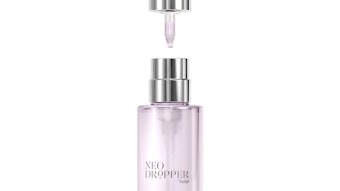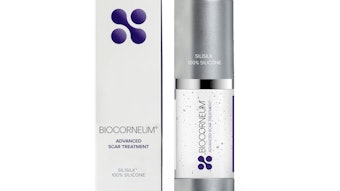Editor's note: This is the edited version of an article that originally ran in the April 2013 issue of Cosmetics & Toiletries magazine. All rights reserved.
The Oxford Dictionary defines feel as “to be aware of a person or object through touching or being touched” and “experience (an emotion or sensation).” This word connects the skin and the brain, which both develop from ectoderm in the embryo and play a similar role of a biosensor interface. The skin/brain connection maintains body homeostasis by processing environmental information and releasing appropriate hormones and mediators. The skin is the human body’s biggest sensory organ—the organ of touch that helps humans make and feel physical contact. There is bidirectional reciprocity, as one cannot be touched without touching. The skin is intimately tied to human emotions, with individuals feeling out of touch and letting things get under their skin. Humans blush with embarrassment, are flushed with pride, turn white with fear, pale with grief and green with envy.1 Life experiences that “touched us” are etched on human skin in the form of lines and wrinkles.
Emotions and Barrier Integrity
The feel good factor in skin care stems from the integrity of the skin barrier. A recent theory hypothesizes that the injured epidermis can affect emotional state and act on the brain, which this author supports based on client feedback in her practice providing skin care consultations and facial treatments.2 Epidermal keratinocytes have sensory systems and play an active role in the maintenance of barrier function. They produce bioactive molecules (i.e., cytokines, neuropeptides, oxytocin and glucocorticoids) in response to barrier impairment or insult, such as environmental dryness or UV radiation, to regulate skin physiology and emotional condition. Those with skin conditions associated with impaired epidermal barrier have reported itching, sleep disturbance and appearance anxiety.
Dermatologists have found a link between the severity of atopic dermatitis and the level of patients’ depression or anxiety; fatigue and depression have been reported in patients with psoriasis. Plasma cytokines and glucocorticoids are associated with depression, and oxytocin is involved in behavior and social bonding. The deterioration of skin barrier function can cause a depressed mental state and vice versa, creating a vicious cycle.2
Stress is known to delay the skin barrier recovery3,4 and stress-reducing interventions show improved rates of healing in psoriasis.5,6 The quality of intimate relationships can also influence the skin barrier. A recent study examined a link between self-reported attachment and skin barrier recovery in young dating couples in satisfied relationships. Greater attachment anxiety predicted faster skin barrier recovery in women and slower skin barrier recovery in men.7
Assessing Life Improvement
The feel good factor, a positive impact of cosmetics on well-being, can be quantified by quality of life (QoL) questionnaires. L’Or7eacute;al and Data Mining International published a validation study of BeautyQol, a questionnaire developed to assess the impact of cosmetic products and physical appearance in healthy adult populations across the world. The questionnaire measured social life, self-confidence, mood, energy and attractiveness.8
An insight into consumer behavior shows that consumers learn to like their products so much that they look forward to their skin care routine every night. Skin care routine is a ritual that demands relaxation. It represents a time where people are sensual and instinctively touch their faces. The moment of touch brings them to the present, and the product scent makes them feel instantly comforted, establishing a positive emotional connection; working directly on the limbic system, scent evokes a sense of relaxation.
Formulating for Skin Feel
The sensory profile of a moisturizer, or “skin feel,” can magnify the feel good factor. Recently, the “incredible feel” has been highlighted in the advertising campaign for Garnier Moisture Rescue by L’Oréal. Sensory properties of moisturizers influence consumers’ compliance, which is essential to achieving skin benefits.
Individual preferences exist within different consumer groups. A study of 200 volunteers with dry skin reported the most important characteristics of a moisturizer to be fast absorption, pleasant scent, ease of application, optimal thickness, and a non-sticky, soothing and silky after-feel. The study established a “perfect” sensory profile of a moisturizer for dry skin that matched the specification of the most commercially successful OTC product in Sweden.9
Similarly, ingredient supplier Croda has advanced its approach to sensorial properties to bring products with novel feel and textures to the market. Sensification—The Science Behind Sensory Innovation is a tool that determines the initial sensory profile to fit a specific product positioning. Properties within five areas of formulation are analyzed, including: appearance, pickup, rub out, immediate after feel and after feel at 20 minutes. The formulation spectrum stretches from light and fluid to heavy and viscous, offering a comprehensive portfolio of emulsifiers.
It is apparent that skin care affects both physiological and psychological well-being. Sensory perception is complex and laboratory instruments can only go so far. Therefore, matching advanced technologies while understanding “the human factor” is the next challenge for the skin care.
References
- J Kabat-Zinn, Coming to Our Senses: Healing Ourselves and the World Through Mindfulness, Piatkus Books Ltd., London (2005)
- M Denda, K Takei and S Denda, How does epidermal pathology interact with mental state? Med Hypotheses 80(2) 194–196 (Feb 2013)
- M Altemus, B Rao, FS Dhabhar, W Ding and RD Granstein, Stress-induced changes in skin barrier function in healthy women, J Invest Dermatol 117(2) 309–317 (Aug 2001)
- N Muizzuddin, MS Matsui, KD Marenus, DH Maes, Impact of stress of marital dissolution on skin barrier recovery: tape stripping and measurement of trans-epidermal water loss (TEWL), Skin Res Technol 9(1) 34–38 (Feb 2001)
- J Kabat-Zinn, E Wheeler, T Light, A Skillings, MJ Scharf, TG Cropley, D Hosmer and JD Bernhard, Influence of a mindfulness meditation-based stress reduction intervention on rates of skin clearing in patients with moderate to severe psoriasis undergoing phototherapy (UVB) and photochemotherapy (PUVA), Psychosom Med 60(5) 625–632 (Sep–Oct 1998)
- ML Price, I Mottahedin and PR Mayo, Can psychotherapy help patients with psoriasis? Clin Exp Dermatol 16(2) 114–117 (Mar 1991)
- TF Robles, KP Brooks, HS Kane and CD Schetter, Attachment, skin deep? Relationships between adult attachment and skin barrier recovery, Int J Psychophysiol (Apr 27, 2012)
- A Beresniak, Y de Linares, GG Krueger, S Talarico, K Tsutani, G Duru and G Berger, Validation of a New International Quality-of-Life Instrument Specific to Cosmetics and Physical Appearance: BeautyQoL Questionnaire, Arch Dermatol 148(11) 1275–82 (Nov 1, 2012)
- I Norin, Sensory analysis—a tool for improving compliance, a presentation at Stratum Corneum, Cardiff, Sept 2012
Katerina Steventon, PhD, of FaceWorkshops, is an independent consultant to the skin care industry and the general public. She holds a doctorate in transdermal absorption and has more than 20 years of experience in skin research at companies, including Shiseido, Juvena/LaPrairie, and Smith and Nephew Wound Management. Her consultancy provides objective recommendations to consumers on personalized skin care routines and facial treatments, and her column for GCI magazine’s sister publication Cosmetics & Toiletries, called “Consumer Perspective,” provides readers with unique insights into this commercial/scientific interface. Contact her at [email protected].










